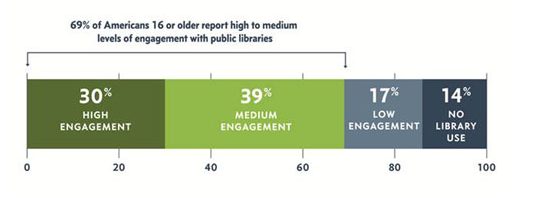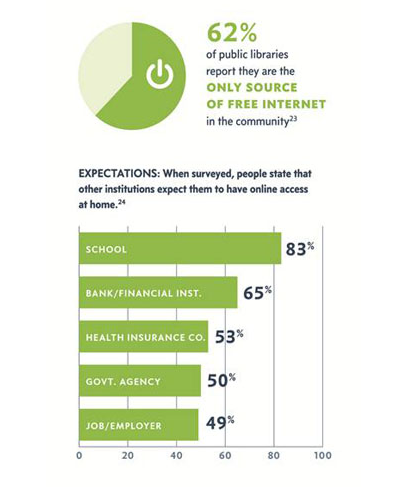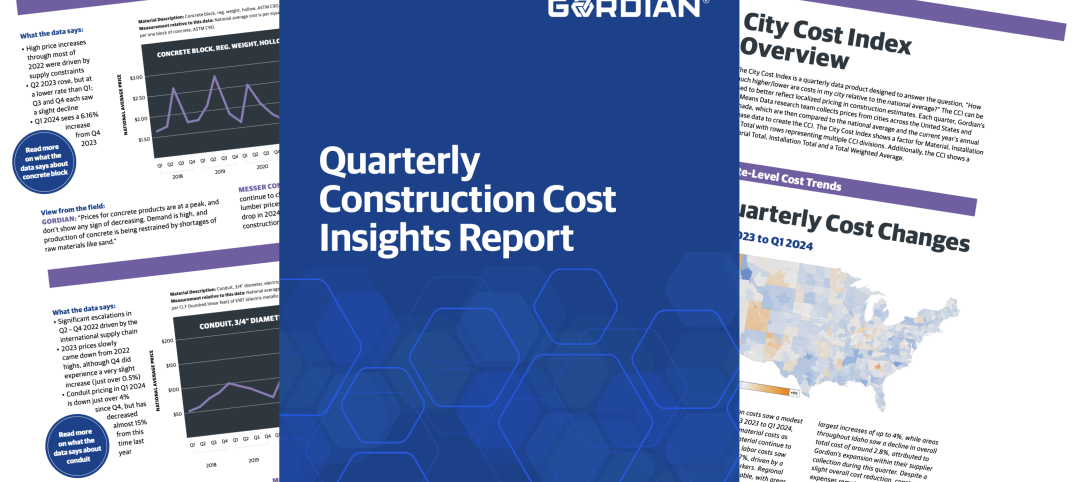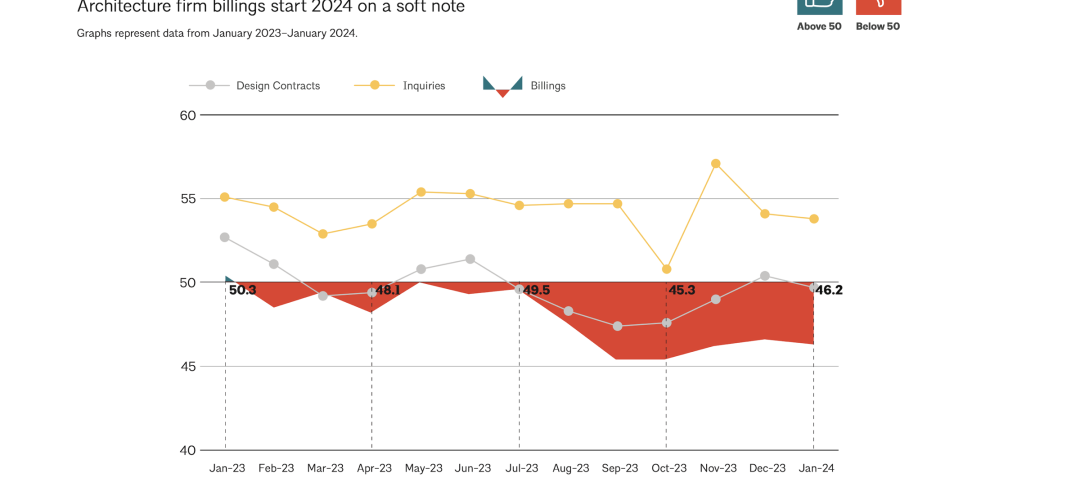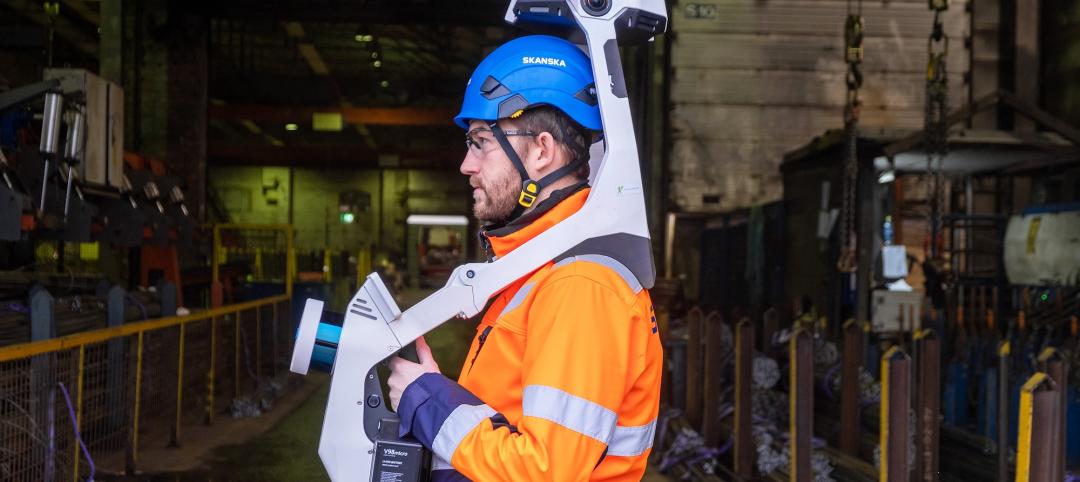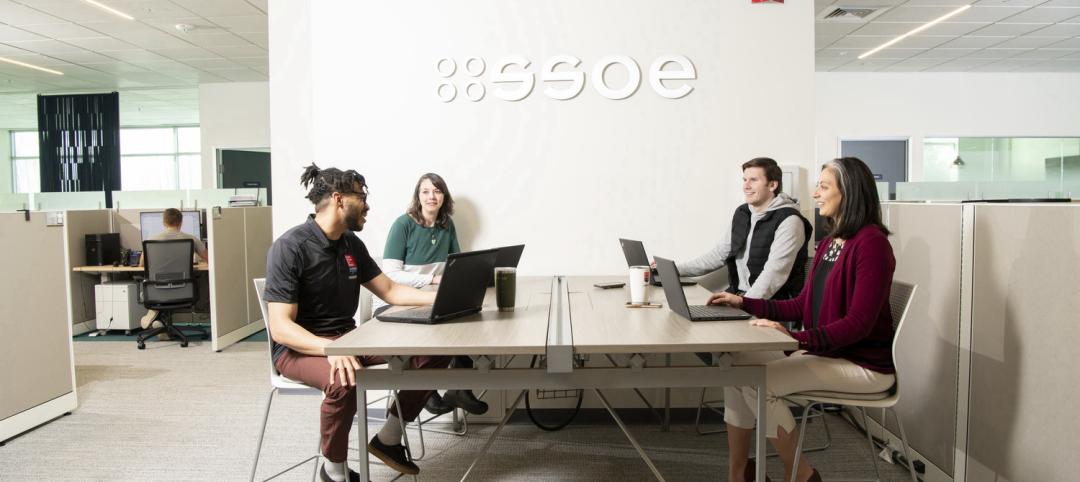Public libraries will avoid being relegated to the scrap heap of history in a digital age as long as they continue to serve as platforms for learning, creativity, and innovation that strengthen their communities.
That’s the conclusion of a new report “Rising to the Challenge: Re-envisioning Public Libraries,” which the Aspen Institute has produced in partnership with the Bill and Melinda Gates Foundation.
There are nearly 9,000 public library systems and 17,000 branches and outlets across the U.S. Nearly seven in 10 Americans say they have at least “medium” levels of engagement with their public libraries. And nearly a quarter of U.S. adults use their local libraries for Internet access.
“The public library is a key partner in sustaining the educational, economic and civic health of the community during a time of dramatic change, [and] there is already a significant physical presence and infrastructure to leverage for long-term success,” the report states.
As important, the library "is a core civil society institution, democracy’s 'maker space,'" the report asserts.
But as public libraries shift from being repositories for materials to platforms for learning and participation, their ability to provide access to vast amounts of content in all formats will be vital. “Libraries face two immediate major challenges in providing access to content in all forms,” the report says. “Being able to procure and share e-books and other digital content on the same basis as physical versions, and having affordable, universal broadband technologies that deliver and help create content.”
A 21st-century library will remain relevant only if it is built on three key assets: people, place, and platform. The report observes that libraries are “shifting from building collections to building human capital, relationships, and knowledge networks in the community.”
While a library is both a physical and virtual place, the report believes its physical presence “anchors it most firmly in the community.” But the library as a learning center is also becoming more of a destination, “a way station on the learning journey.” In that capacity the library in a digital age should also be “a virtual space accessible from anywhere 24/7.”
A library’s goal, says the report, should be to enable individuals and communities “to create their own learning and knowledge.” So a library “platform” needs to be adaptable to the individual’s needs. “The library as platform radically reshapes [its] daily activities, shifting away from the old model of organizing and ‘lending’ the world’s knowledge toward a new vision of the library as a central hub for learning and community connections.”
To be successful in a digital age, libraries, says the report, will require a different kind of access and distribution infrastructure, more sophisticated analytics “that will enable the library itself to become a “learning organization,” and the ability to scale themselves to facilitate innovation and competition.
The report recommends four strategic opportunities for action to guide libraries’ transformation: aligning their service to support community goals, providing access to content in all formats, ensuring the long-term sustainability of public libraries through greater attention to potential financial resources, and cultivating “leadership.”
But library professionals face several leadership challenges, such as taking advantage of digital tools; building the library’s capacity, which might benefit from exploring best practices outside the U.S.; thinking harder about succession planning; including trustee and “friend” groups in leadership development activities; and developing strategies that can keep pace with larger disruptive changes.
Libraries and their communities must also be watchful, and be prepared to respond to, several important developments and trends, including new technologies and their impact on a global information economy, online education, the boundaries of privacy and data protection, and “hyperconnected” societies.
Related Stories
Performing Arts Centers | Feb 27, 2024
Frank Gehry-designed expansion of the Colburn School performing arts center set to break ground
In April, the Colburn School, an institute for music and dance education and performance, will break ground on a 100,000-sf expansion designed by architect Frank Gehry. Located in downtown Los Angeles, the performing arts center will join the neighboring Walt Disney Concert Hall and The Grand by Gehry, forming the largest concentration of Gehry-designed buildings in the world.
Construction Costs | Feb 27, 2024
Experts see construction material prices stabilizing in 2024
Gordian’s Q1 2024 Quarterly Construction Cost Insights Report brings good news: Although there are some materials whose prices have continued to show volatility, costs at a macro level are returning to a level of stability, suggesting predictable historical price escalation factors.
High-rise Construction | Feb 23, 2024
Designing a new frontier in Seattle’s urban core
Graphite Design Group shares the design for Frontier, a 540,000-sf tower in a five-block master plan for Seattle-based tech leader Amazon.
Construction Costs | Feb 22, 2024
K-12 school construction costs for 2024
Data from Gordian breaks down the average cost per square foot for four different types of K-12 school buildings (elementary schools, junior high schools, high schools, and vocational schools) across 10 U.S. cities.
MFPRO+ Special Reports | Feb 22, 2024
Crystal Lagoons: A deep dive into real estate's most extreme guest amenity
These year-round, manmade, crystal clear blue lagoons offer a groundbreaking technology with immense potential to redefine the concept of water amenities. However, navigating regulatory challenges and ensuring long-term sustainability are crucial to success with Crystal Lagoons.
Architects | Feb 21, 2024
Architecture Billings Index remains in 'declining billings' state in January 2024
Architecture firm billings remained soft entering into 2024, with an AIA/Deltek Architecture Billings Index (ABI) score of 46.2 in January. Any score below 50.0 indicates decreasing business conditions.
University Buildings | Feb 21, 2024
University design to help meet the demand for health professionals
Virginia Commonwealth University is a Page client, and the Dean of the College of Health Professions took time to talk about a pressing healthcare industry need that schools—and architects—can help address.
AEC Tech | Feb 20, 2024
AI for construction: What kind of tool can artificial intelligence become for AEC teams?
Avoiding the hype and gathering good data are half the battle toward making artificial intelligence tools useful for performing design, operational, and jobsite tasks.
Engineers | Feb 20, 2024
An engineering firm traces its DEI journey
Top-to-bottom buy-in has been a key factor in SSOE Group’s efforts to become more diverse, equitable, and inclusive in its hiring, mentoring, and benefits.
Building Tech | Feb 20, 2024
Construction method featuring LEGO-like bricks wins global innovation award
A new construction method featuring LEGO-like bricks made from a renewable composite material took first place for building innovations at the 2024 JEC Composites Innovation Awards in Paris, France.



